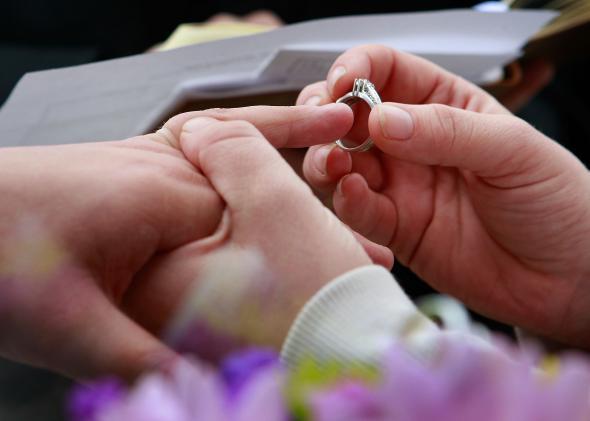Now we really have heard it all in the marriage equality battle.
During today’s oral argument before a federal district court judge in Philadelphia in Palladino v. Corbett, Joel Frank, one of the attorneys representing Gov. Thomas Corbett, couldn’t bring himself to justify the Pennsylvania legislature’s decision to pass its Defense of Marriage Act. More than ever, it now seems inevitable that this whole marriage fight will soon be over.
It wasn’t that Judge Mary McLaughlin didn’t try to pry the arguments out of Frank. Repeatedly, she asked him to discuss the state’s justifications for excluding same-sex couples from marriage that are prominently featured in their briefs—the state’s interest in procreation, the idea that the best interests of children are served by the law, and the economic impact of allowing same-sex couples to marry. Inasmuch as the attorney for the plaintiffs, Michael Banks, had already sliced and diced these rationales, Frank’s insistent demurral was all the more puzzling.
Instead, Frank stood on the position that it wasn’t up to the state to put forth any evidence to justify the law and that the plaintiffs had failed to justify their position that the asserted rationales weren’t persuasive. He claimed that there only had to be some kind of rational basis for the legislation, which, he noted, had passed overwhelmingly.
McLaughlin didn’t seem to buy any of this. She clearly didn’t give a rap about how one-sided the vote had been and wondered aloud why the state hadn’t made the point about the lack of evidence before today. She wanted arguments from Frank, not a dance around the justifications. “I’m trying to focus on the reasons for the law,” she said, and whether those reasons are valid in the Brave New Post-Windsor World. (More on United States v. Windsor in a minute.) Even if the court was going to be deferential to the state, its advocates had to show … something.
Banks had torn through the tissue-thin rationales in no time at all. Procreation isn’t a condition of marriage, and, in any case, the couple in question had procreated. (The plaintiffs, Isabelle Barker and Cara Palladino, have a son. Obviously, some outside assistance was needed for the procreation to take place, but that’s true in plenty of opposite-sex cases, too.) The whole idea that allowing same-sex marriages wouldn’t be in the best interests of children is defeated by the plain fact that the kids of same-sex marriages are “demeaned” and “humiliated,” in the words of Justice Anthony Kennedy in Windsor, by their parents’ inability to marry. And the economic impact argument (which, oddly, Judge McLaughlin said she found the strongest of the batch) is, frankly, just silly. Excluding any group from the benefits of marriage, including those married on a Tuesday, will save the state money. The issue is whether the exclusion is independently justified.
McLaughlin wanted a response, but she barely got one despite repeated importuning. Frank finally muttered something about how the state is entitled to the view that requiring a mother and a father brings gender diversity to marriage, but then he quickly scooted back to his bunker, from whence he continued to assert that the legislature was entitled to deference.
But, McLaughlin insisted, doesn’t the decision of the Supreme Court in United States v. Windsor provide the plaintiffs with a strong legal argument that these state DOMA laws are unconstitutional? What kind of evidence could possibly be needed to support what Justice Kennedy, in holding that the federal Defense of Marriage Act was unconstitutional, said were the humiliating and demeaning effect of such laws on same-sex couples and their kids?
Windsor, of course, is the elephant crushing all state DOMA laws. As McLaughlin mentioned at least thrice, all eight district courts that have considered the constitutionality of state anti-gay-marriage laws since the Windsor decision was issued have found them unconstitutional. Language about the dignity and equality of families headed by same-sex couples courses strongly throughout Windsor and has proved too strong to counter.
In principle, states do have one potentially powerful argument, also growing out of Windsor. Justice Kennedy’s opinion emphasizes that DOMA must have been the product of dislike of gay people, because Congress usually leaves marriage to the states. Therefore, Pennsylvania’s decision to retain the traditional (read: homo-excluding) definition of marriage should be respected. McLaughlin seemed to be struggling with how to balance those two strands of Windsor.
Here, though, the unique nature of the Palladino case should help the plaintiffs. Because unlike the other eight cases, this one is only about that part of the state DOMA that denies recognition of out-of-state gay marriages. Palladino and Barker were married in 2005 in Massachusetts, but when they moved to Pennsylvania the following year, their marriage was declared null and void. Banks homed in on this feature of the case, noting that, like the federal DOMA, Pennsylvania’s law operated in this case to disrespect a relationship that another state had deemed worthy of recognition.
Of course, one way of answering this argument is to note that Pennsylvania’s laws are also entitled to respect. But then we return to the question: What interests of Pennsylvania are served by excluding same-sex couples from marriage? And there, again, the state wouldn’t go.
So it’s come to this: The state’s reasons for opposing same-sex marriage are now unspeakable.
